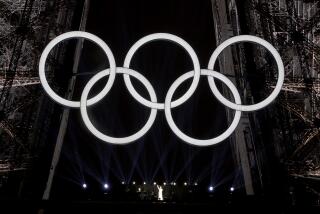A Bastille Day revolution
- Share via
It may not be surprising that Prince Charles-Henri de Lobkowicz, a descendant of France’s King Charles X (the youngest brother of the executed Louis XVI), wears a black tie every year on Bastille Day. Or that Marc de Gontaut-Biron, a member of an ancient noble French family, wears only royal blue, the color of the Bourbon flag, on July 14.
Or that Gontaut-Biron’s circle of friends in Paris, many of whom still refer to the Republic as la gueuse (the tramp or beggar), escape to their chateaux every year on that day and drape their windows in black and shutter their doors as a symbol of mourning. Why wouldn’t they feel that way? The storming of the Bastille, a prison in Paris, on July 14, 1789, meant no good for the French aristocracy, which was overthrown in the revolution that followed.
But these days, it’s not just the ancestors of aristocrats who have little interest in Bastille Day. Although Americans often think that July 14 is as important in France as July 4 is in the United States, the reality is that the holiday is of less and less significance as the years pass. Today, many French citizens, whether their ancestors went to the guillotine or not, do not take part in the celebrations, and for a variety of reasons.
Some complain about the holiday’s militaristic nature. Georges Brassens, a self-professed anarchist often referred to as France’s Bob Dylan, wrote in his anthem, “La Mauvaise Réputation”: “On July 14, I remain in my downy bed/those military marches are of no concern to me/surely I am not hurting anyone/not listening to the sound of bugles.” (That’s a translation, of course.) Similarly, Maialen Berasategui, a fourth-year history student at the Sorbonne who says that Bastille Day is “too military for me,” told me: “I’ll bet there are more opponents from the anarchist groups than the royalists.”
Of course, the holiday has always had militaristic overtones since it was first celebrated in 1790, just a year after the storming of the Bastille. On that July 14, a grand and solemn ceremony, meant to demonstrate France’s history of military might, took place on the Champs de Mars, opposite the École Militaire. Soldiers from each of the new 83 departments of France assembled at 4 a.m. at the Bastille to march along the right bank of the Seine. Nearly 600,000 people came from all over France, spilling out onto the streets of Paris.
Even Louis XVI and his family appeared that day -- despite the anti-royalist sympathies of those who had stormed the Bastille the previous year. The royal children, Marie-Thérèse and her little brother, the Dauphin (who later would be tortured to death in the Temple prison), stood on their tiptoes to watch the festivities.
But militarism is not the only reason why Bastille Day is not what it once was. Another explanation for the growing reluctance to express the kind of patriotism usually associated with banner-waving and marching bands is the generational shift in France. Berasategui suggests that, these days, the issue is more one of indifference, rather than resistance, to the idea of Bastille Day.
“My mother grew up learning the French departments, rivers, etc.,” she said. “But my generation grew up with the fall of the Berlin Wall. I learned European flags, populations, capitals and about the EU. We’re changing, and the way we feel that we are French is changing too.”
Americans travel to France in droves every summer to soak in what is unique to French culture -- the fashions, the cuisine and the elegant lifestyle. But as a member of the European Union, France may be losing its identity.
Last year, on July 14, Nicolas Sarkozy, the country’s newly elected president, dispensed with the customary Bastille Day mass pardon of prisoners who have committed petty offenses. And he gave no presidential state-of-the-nation interview with the media. Instead, he said he wanted to make the world “look at France through different eyes.”
To send that message, Sarkozy, a proponent of a united European militia, marched in a Bastille Day parade composed, for the first time, of soldiers from all 27 EU member countries. Is the party over?
Susan Nagel, a professor at Marymount Manhattan College, is the author, most recently, of “Marie-Thérèse, Child of Terror: The Fate of Marie Antoinette’s Daughter.”
More to Read
Sign up for Essential California
The most important California stories and recommendations in your inbox every morning.
You may occasionally receive promotional content from the Los Angeles Times.













